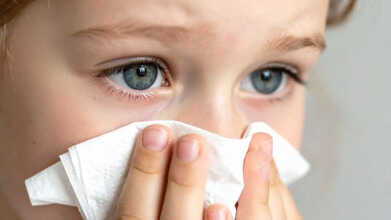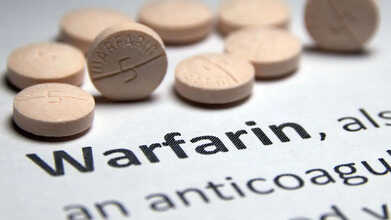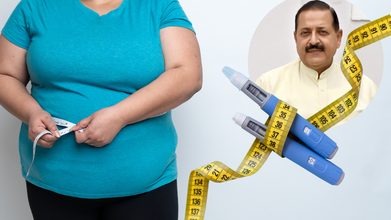- Health Conditions A-Z
- Health & Wellness
- Nutrition
- Fitness
- Health News
- Ayurveda
- Videos
- Medicine A-Z
- Parenting
Weekly Health For October 20- 26, 2024: A Small Amount Of Self-Care Will Pay Off Greatly

Weekly health horoscope
Aries
Aries people should concentrate this week on actively seeking ways to better their health. If you exclude consistent exercise and physical activities from your daily schedule, you could feel low on energy. This is the moment to stop postponing and start toward a better way of life. Add a diet high in nutrients and make sure you receive enough sleep. Steer clear of assuming your present health is perfect; instead, try actively to increase your power and energy.
Taurus
This week Taurus locals will feel a rush of physical vitality. Participating in physical activities as yoga, swimming, or aerobics could make you more motivated. This is a perfect moment to concentrate on leisure activities you enjoy and that boost your general level of fitness. Make sure you, however, balance enough relaxation with physical effort. If you give both active and recovery times some thought, your body will flourish this week.
Gemini
Gemini people should be aware of their eating this week. To keep optimum health, cut processed foods and choose fresh, organic vegetables. You should strengthen your immune system with the correct nutrients as you can be prone to minor health problems like colds or coughs. This week demands a balanced lifestyle, hence emphasizing preventative health practices may help you avoid possible future health issues.
Cancer
For cancer patients, this week is important about increasing physical activity. Either follow an aggressive fitness program or concentrate on building your core with abdominal exercises. Attaching a fitness facility or learning yoga can help you keep on target. Furthermore enhancing your mental health is spending time for mindfulness and meditation. This is the week to give self-care top priority and improve your mental as well as physical condition.
Leo
This week Leo locals could experience the consequences of a compromised immune system. Including important nutrients in your diet and correcting any deficits influencing your energy levels can help you to improve your health. If you have any symptoms of weakness, consult a doctor rather than discount them. Emphasize on strengthening your endurance and stamina to prevent any possible health issues this week.
Virgo
Particularly in the mornings, Virgians should keep up their workout regimens. Along with increasing your energy, early morning stretches, yoga, and jogging will help you be more mentally clear. To keep inspired and challenge your body, try adding fresh exercise techniques to your program. Through consistent, disciplined physical activity, this week presents chances for major improvement in your general health and well-being.
Libra
Libra locals will be physically and psychologically energised this week. Harnessing this vitality requires a regular exercise schedule. Your health will benefit much from running, cycling, even a fast walk. Remember to include mindfulness techniques such as meditation to keep equilibrium between bodily and psychological well-being. Staying active and feeling rejuvenated comes easiest this week.
Scorpio
This week, native Scorpios should give their physical and emotional health top priority. Meditate and gentle exercise first thing in the morning to maintain your body active and mental peaceful. If you keep dedicated to a daily schedule, your vitality will rise. Deep breathing exercises help one prevent mental tension as well. For best health, take care of your mind as much as your body.
Sagittarius
Native Sagittarius people should concentrate on stretching their fitness range this week. This is the ideal moment to push your fitness to the next level whether that means adding more intensity to your present program or starting a new one. Your health objectives will be easier to reach as you experience a boost in drive and energy. Keeping a balanced, healthy diet, use this momentum to develop a stronger, more fit body.
Capricorn
Although Capricorn people can feel tired this week, you can get your energy back with a balanced diet and enough physical activity. One should concentrate on light workouts and receive ample relaxation as needed. This week calls for you to strike a balance between your activity level and make sure you are not overdoing it. A good diet can also enable you to regain vigor and strength.
Aquarius
This week Aquarius natives should concentrate on changing their diets. Steer clear of processed foods and give fresh, nutritious meals top priority. Preventive care is absolutely vital to preserve long-term health even if you don't now have any current medical issues. This week maintain your body and mind in harmony via light physical activity and mindfulness meditation. A small amount of self-care will pay off greatly.
Pisces
Environmental elements could be causing some residual health problems for Pisces residents. This week concentrate on giving your body the correct nutrients and supplements to strengthen your immune system. Don't ignore your body's needs; recuperation depends mostly on appropriate diet and medical treatment. As the week goes on, you will feel both physically and psychologically more robust with the correct treatment.
Flu Incubation Period: How Long Does It Take For Symptoms To Appear?

Credits: Canva
Influenza, commonly called the flu, is a respiratory infection caused by the influenza virus. It is contagious, which means it passes easily from one person to another. Although influenza viruses can circulate throughout the year, infections are seen more often during the fall and winter months. This time is known as the flu season. As flu cases are rising across many parts of the US and UK, here are a few key points to understand, from the incubation period to how easily the virus spreads.
What Is The Flu (influenza)?
The flu is an infection caused by the influenza virus. It usually leads to symptoms such as body and head aches, sore throat, fever, and breathing-related discomfort, which can sometimes become serious. Flu cases tend to peak during the winter months, when large numbers of people may fall ill at the same time, a situation described as an epidemic, according to the Cleveland Clinic.
Flu: What Is The Incubation Period Of The Flu?
The average incubation period of the flu is around 2 days, though it can vary from 1 to 4 days. In simple terms, this means most people begin to notice flu symptoms a few days after the virus enters the body.
When Does The Flu Become Contagious?
After catching the flu virus, a person can start passing it on to others about 1 dayTrusted Source before symptoms appear. Keep in mind that the usual incubation period is about 2 days. So, if someone is exposed to the virus on a Saturday morning, they may already be able to spread it by Sunday evening. By Monday afternoon, flu symptoms are likely to show up. These symptoms can be mild or severe.
Some people may not develop symptoms at all, but they can still spread the virus. The flu is usually most contagious during the first 3 days of illness. After symptoms begin, a person may continue to infect others for another 5 to 7 days. Children, older adults, and people with weaker immune systems may remain contagious for a longer time.
Flu Symptoms 2025: Early Symptoms You Need To Take Care Of
Unlike the common cold, which tends to develop slowly, flu symptoms often appear suddenly.
Common symptoms include:
- feeling extremely tired, exhausted, or weak
- headache
- blocked or runny nose
- sore throat
- dry cough
- muscle and body aches
- fever or chills, although not everyone gets these
- vomiting or diarrhoea, which is seen more often in children
Most people start to feel better within a few days to two weeks. However, some individuals may need antiviral medication, particularly those at higher risk of serious complications.
How Does The Flu Spread?
The flu mainly spreads through tiny respiratory droplets released when an infected person coughs or sneezes. In crowded places, these particles can be inhaled by others, leading to infection. The virus can also spread by touching objects or surfaces that carry the virus, such as door handles or shared personal items. Outside the body, the virus can survive on surfaces for up to one day.
If someone touches a contaminated surface and then touches their eyes, nose, or mouth, the flu virus can enter the body and cause infection.
Taking Warfarin? Doctor Warns This Common Food Could Be Reducing Your Medication’s Effect

Credits: Canva
People who are prescribed blood thinners, also known as anticoagulants, could unknowingly weaken the effect of their medication by eating a widely consumed and otherwise healthy vegetable, a doctor has warned.
What Are Anticoagulants?
Anticoagulants are routinely given to reduce the risk of blood clots and are often prescribed to those who face a higher chance of such complications. This group also includes people at increased risk of heart attacks or strokes. These medicines, which include rivaroxaban, apixaban and warfarin, work by interrupting the clotting process and play a key role in preventing serious conditions such as strokes, heart attacks, pulmonary embolism and deep vein thrombosis.
Warfarin: Why This Common Vegetable Can Be A Problem
While anticoagulants are effective and often lifesaving, patients are being advised that a familiar garden vegetable could interfere with how well these drugs work. The warning comes from Dr Chris Steele, who appeared on ITV’s This Morning to explain how certain foods can interact negatively with different medications.
As part of his advice, he said, as per Express, “Leafy greens are high in vitamin K, which helps blood to clot. Warfarin works by blocking vitamin K production, so if you suddenly increase how many greens you eat, it can affect how the medicine works.”
He added: “Other foods that contain a lot of vitamin K include green vegetables, egg yolks, chickpeas and lentils. These foods don’t need to be removed from the diet, but it is important to keep your intake steady and consistent. You should also avoid drinking large amounts of cranberry juice or using cranberry products while on anticoagulants, as they can alter the effect of warfarin. Garlic and ginger should be limited too, as they can raise the risk of bleeding.”
Warfarin: Other Food And Drug Interactions To Watch For
Dr Chris also highlighted that many other medicines can react in unexpected ways when taken alongside certain foods and drinks. For example, he noted that some antibiotics, including ciprofloxacin, can react poorly with milk.
He explained: “Calcium can reduce how well some antibiotics work, so these medicines should not be taken at the same time as foods high in calcium, such as milk, yoghurt or cheese. Calcium supplements should also be avoided for a few hours before and after taking these antibiotics.
“You should not drink milk when taking certain antibiotics, including tetracycline and ciprofloxacin, which are quinolone antibiotics, or some osteoporosis drugs like alendronate, also known as Fosamax.”
He further advised avoiding the following combinations with specific medicines:
- Grapefruit if you are taking statins for high blood pressure
- Black liquorice if you are on certain heart medicines such as digoxin
- Bananas if you take some ACE inhibitors for high blood pressure
- Coffee if you use bronchodilators for asthma
- Smoked salmon and salami if you are prescribed antidepressants
- Limes if you are taking cough medicine
Dr Chris stressed: “Always speak to your doctor about any precautions you should follow when starting a new medication. You may need to avoid certain foods, make changes to your lifestyle, or take other steps to prevent unwanted side effects.”
Anti-obesity Drugs Must Be Used Judiciously, Says Union Minister Dr Jitendra Singh

Credits: iStock and Facebook
Dr Jitendra Singh, the Union Minister of State for Science & Technology, Earth Sciences and MoS PMO said that weight reducing or anti-obesity drugs must be used judiciously. Dr Singh himself is a noted diabetologist and professor of medicine. He noted that obesity is a complex, chronic and relapsing disorder, "not merely a cosmetic or lifestyle concern". He called for a "whole-of-society" approach to effectively combat this health challenge that India is facing.
His remarks on obesity and usage of weight loss drugs were made at the inaugural session of the 2-day Asia Oceania Conference on Obesity. He pointed out that obesity cannot be treated with shortcuts, as it is a chronic disease.
India and Obesity
India is facing a severe and rapidly growing obesity epidemic, and it has become a major global hotspot with rising numbers of obesity patients across all ages, especially in the urban areas, noted UNICEF-organized national media roundtable. This is due to the increase in sedentary lifestyles, and processed foods. According to UNICEF’s Child Nutrition Global Report 2025, launched recently, obesity has, for the first time, surpassed underweight globally as the most common form of Malnutrition among school-aged children and adolescents. So is the case in India.
Dr Singh highlighted that India is witnessing a worrying rise in Non-communicable diseases or NCDs, which are also linked to obesity in a way. This has accounted for nearly 63 per cent of overall mortality. He also said that conditions like type 2 diabetes, cardiovascular diseases and certain cancers are linked to obesity, including central visceral obesity, which he says is "particularly prevalent among Indians and poses independent health risks even beyond overall body weight".
What Does The Data Say On Obesity In India?
The National Family Health Survey (NFHS) data shows that India is witnessing a rapid surge in overweight and obesity among children under five, with prevalence rising by 127 per cent, which has increased from 1.5 per cent to 3.4 per cent between NFHS 3 (2005-06) and NFHS 5 (2019-21).
Similarly, overweight and obesity rates among adolescents have risen sharply, increasing by 125 per cent in girls (from 2.4 per cent to 5.4 per cent) and a staggering 288 per cent in boys (from 1.7 per cent to 6.6 per cent).
Among adults, prevalence climbed by 91 per cent in women (from 12.6 per cent to 24.0 per cent) and 146 per cent in men (from 9.3 per cent to 22.9 per cent), underscoring a nationwide health crisis (NFHS-5, 2019–21).
By 2030, India is projected to have over 27 million children and adolescents aged 5 to 19 living with obesity, accounting for 11 per cent of the global burden (CNNS 2016–18).
What Is India Doing To Combat Rise In Obesity?

Dr Singh highlighted that under the leadership of Prime Minister Narendra Modi, India has taken steps to make health a priority. PM Modi's emphasis on small, sustainable changes in food habits and daily routines reflects a clear recognition of obesity as a national priority, closely aligned with initiatives like FIT India, Khelo India, and other versions of preventive healthcare. He also noted that Ayushman Bharat, mass screening programmes, and many health care initiative, along with integrating traditional system of medicine has also helped India to curb its obesity problems down.
Dr Singh also emphasized on the need of public awareness, especially in food habits like adoption of refined oils, or myths and disinformation that surround such health condition. To combat this, he launched the AIAARO ( All-India Association for Advancing Research in Obesity) Obesity Registry, a significant initiative aimed at strengthening India’s obesity research ecosystem through systematic data collection, evidence-based insights, and long-term policy support.
© 2024 Bennett, Coleman & Company Limited

